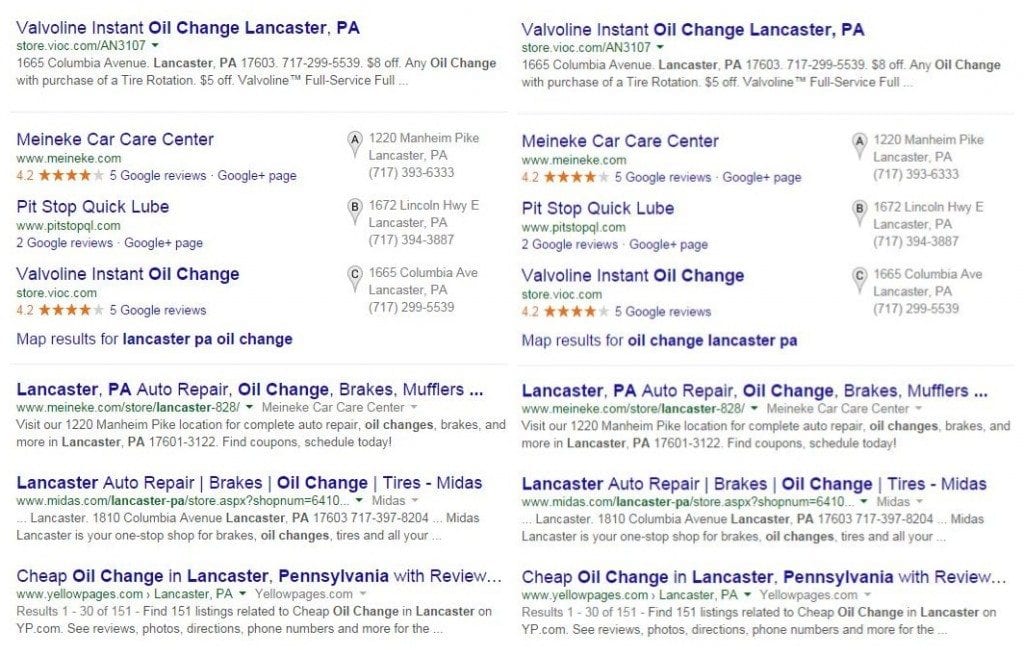Google Doesn’t Care About Keyword Order Anymore
Mike McGovern | Oct 7, 2014
Internet Marketing Lancaster. Internet Marketing in Lancaster PA.
We’ve all seen webpage titles with specific phrasing like this. There was a time when paying attention to keyword order really mattered for ranking on Google. The thinking was that if you wanted to rank for, let’s say “Lancaster PA oil change,” then you’d better have a page on your website targeted to that exact phrase.
Not so much anymore.

Google has gotten much smarter about how it produces search results. As a result, the line between semantically similar phrases and the search results that they produce is becoming blurred.
Look at this example. Here we have two similar searches: “Lancaster PA oil change” (left) and “Oil change Lancaster PA” (right). The results are identical.

Now, this is only one example, but it is a glimpse of a much larger trend toward semantic or “entity” search that experts who follow Google have been telling us about for the last year.
What Is Semantic/Entity Search?
Last September, Google rolled out its Hummingbird algorithm update. The update represents a big step toward Google’s goal to transition from being a search engine to an answer engine. Hummingbird places emphasis on search context and intent, as more and more search moves to mobile devices. For example, search “delivery” on a smartphone and you’ll get restaurant and food-related results nearby (based on your phone’s internal GPS). Incorporating additional data about a user’s context and intent (based on search history and other factors) into its algorithm produces more accurate answers faster (hence the name Hummingbird).
Google also has figured out synonyms and related words/phrases through co-occurrence in text. Google is moving so that your “oil change” query could use related words interchangeably and would still give you similar results:
- place
- garage
- mechanic
- where
As in:
- best place to get an oil change in lancaster pa
- best garage to get an oil change in lancaster pa
- best mechanic for an oil change in lancaster pa
- where to get an oil change in lancaster pa
Right now, those searches are yielding different results, but in some larger cities and industries (say, Philadelphia hotels or restaurants), they’re most likely getting more similar by the month.
Ask any human, “What’s the best place to get an oil change around here?” or “Where’s the best garage to go to get my oil changed?” and you’ll get the same answer. Google wants to be like that, too.
What You Can Do
Focus on topics, not keywords, and provide more holistic content on your website.
Here’s the first step toward that goal using the oil change example again.
Let’s say you have 1 main page about oil changes with 3 sub-pages related to it on your site. It might be a good idea to consolidate that content from 4 pages into 1. Now read that page again. What might a potential visitor want to know that this content isn’t answering? Answer it for them! Think beyond your business’s service offerings and delve into the topic from a higher level.
What expertise do you have about a topic that you can share with your audience?
Potential questions to answer:
- Why are regular oil changes important?
- What does oil do for my car?
- How often should I get an oil change?
- What’s the difference between conventional and synthetic oil?
- What brands do you offer?
- Are your service technicians certified?
- How much will it cost? Any discounts?
- When can I bring my car in for service?
- How long will it take?
- What do other customers have to say about your business (online reviews)?
The Bottom Line
You can’t get away with thin content that is targeted at a specific keyword and think that you’ll continue to rank. Begin producing (or revising) pages on your website that cover topics, not keywords. If the experts are right (and they probably are), over time Google will re-pay you for your hard work with better visibility on its search results, which will lead to more website visits and potential customers.